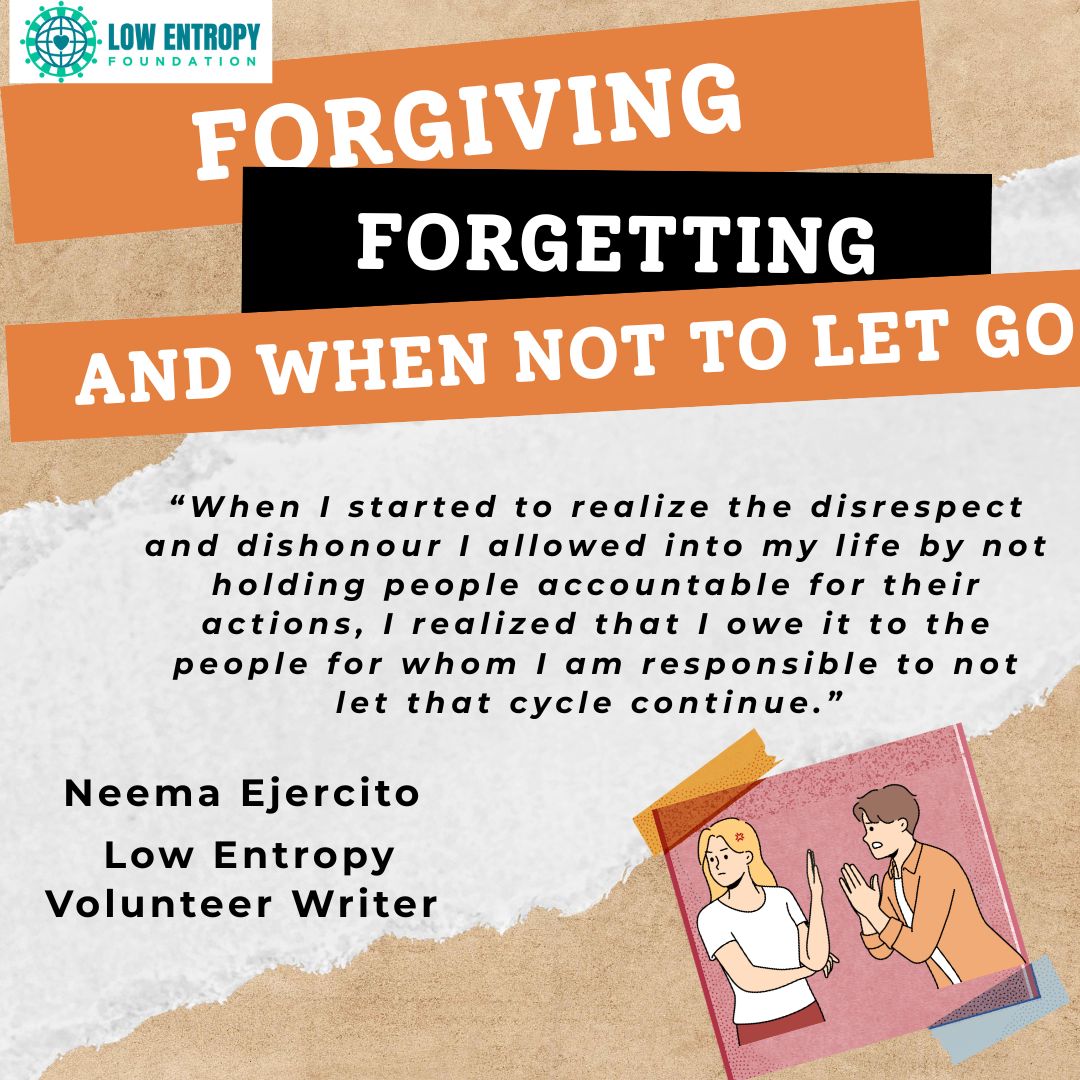Neema Ejercito (she/her/hers), Low Entropy Volunteer Writer
Merriam-Webster and Oxford dictionaries define forgiveness as the purposeful act of “freely [transferring . . . ] the possession of (something) to (someone).” I have taken the liberty of breaking down the word into its prefix and suffix to address the letting go aspect some people have come to expect from being forgiven. Like “sorry” and “thank you,” “please forgive me” has been thrown around too much. And just like those words, asking for forgiveness sometimes comes with the demand to be forgiven, neglecting accountability and genuine relationship repair.
Using the same sources, forgetting is defined as the purposeful act of receiving. And the one forgiving receives the other’s apology only when there is something new to replace the damage. That is what entitles forgiveness to have its own word. Without the “change of character” described when I looked up repentance, which led me to look up penitence, forgiveness is half-baked.
I go on about this quick etymology because I have had to learn the hard way how much value my forgiveness holds and how much it needs to be respected. Having been raised Christian, the words I mentioned (except for “forget”) were thrown around a lot, to the detriment of the hearts and souls of the words. We were taught to follow Jesus’ advice to forgive 70 times seven times, or some number that is supposed to depict God’s eternal mercy. What people tend to forget though, is the part where consequences still follow and that relationships are still broken unless the one seeking forgiveness not only stops what was causing the hurt and brokenness in the relationship, but also addresses it in the way that the forgiver needs.
I used to believe that when someone said sorry to me, that my forgiveness was automatic and that the slate was wiped clean. I lived that way for many years and did not realize how harmful this was to me and, in turn, to my loved ones. No one wants to hear that we allow people to treat us like doormats, but those were the painful, albeit helpful words I heard from my therapist. When I started to realize the disrespect and dishonour I allowed into my life by not holding people accountable for their actions, I realized that I owe it to the people for whom I am responsible to not let that cycle continue.
I had to break decades of conditioning that perhaps other people were not aware of or had learned to endure. What was important for me in learning to not let go of what had been done was also learning what was in my control to change and to only let go of what I couldn’t—which was the other person’s decision on whether or not to take responsibility for restoring what was broken. I suppose it was easier to not take care of myself, as it felt easier to see the other person seemingly happy, but I was actually truly unhappy and stunted in growth. Part of me felt responsible for their growth when I was neglecting mine. In truth, in neglecting mine I was contributing to their decline as well.
Oddly enough, it was the wisdom of my mother-in-law that helped me come to that truth. As a fellow mother, I had asked her if it was okay that I could not let go of what loved ones had done to me. She promptly replied yes, reminding me of a similar thing that had been done to her. We forgive, but we can’t forget what was done, so we don’t let go. Because letting go would mean we are tolerating their behaviour when we have already stood our ground and told them the work we had done in repairing ourselves. We expect the same from those who have hurt us because we care for them and still, whether or not they feel it or understand it, love them and also want what’s best for them and for them to also reach their best versions of themselves, or at the least to keep going.
We commonly hear how much we need to surround ourselves with people who help us grow. If that means not letting go of the growth I have made because of an experience I cannot forget and because the one asking for forgiveness has not fulfilled their part of what makes the definition whole, then I cannot let go of what has been done to me and must, for my survival, move on.
Sources:
Merriam-Webster. (n.d.). For definition & meaning. Merriam-Webster. https://www.merriam-webster.com/dictionary/for
Merriam-Webster. (n.d.-b). Get definition & meaning. Merriam-Webster. https://www.merriam-webster.com/dictionary/get
—
Before returning from her summer vacation in the Philippines with her partner and three offspring this year, Neema Ejercito did not realize she still had so much to write about. Such as the boredom she felt raising her eldest at her in-laws’ place when she and her husband hadn’t moved out yet. Or how surreal it was to watch her youngest learn to swim at the country club where she learned to do so as well. She currently wonders if she will ever write about being a mother to a bunch of plants, all of whom she adores and loves to watch grow as much as her kin.

